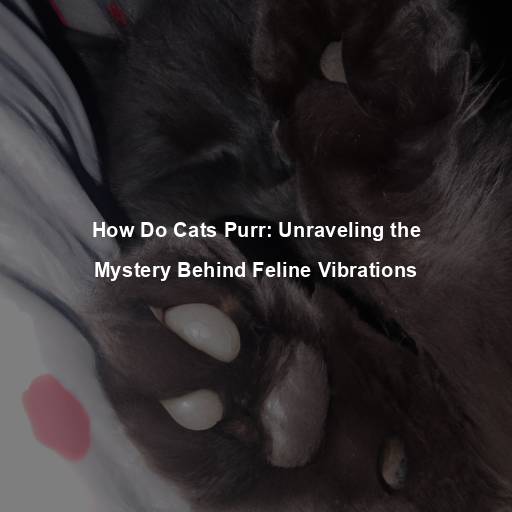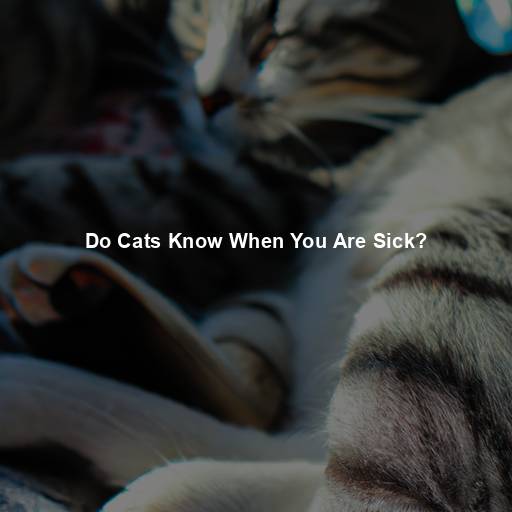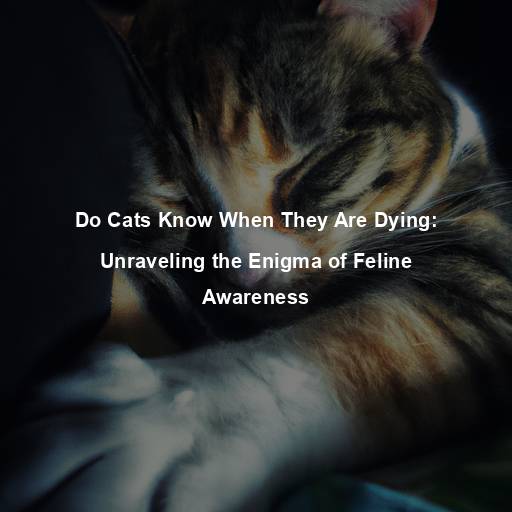What to Do When Your Beloved Cat Falls Ill: A Guide for Pet Parents
Last Updated on November 20, 2023 by Evan
Contents [hide]
- 1 Understanding the Signs of a Sick Cat
- 2 Seeking Veterinary Care: The Importance of Professional Help
- 3 Home Care for Your Sick Cat: A Guide for Pet Parents
- 4 When to Contact Your Veterinarian
- 5 The Power of Love and Care
- 6 Understanding the Limitations and Risks
- 7 Consultation and Collaboration
- 8 FAQs – When Cats Get Sick: What to Do
- 8.1 How can I tell if my cat is sick?
- 8.2 Should I take my cat to the veterinarian if it has a minor illness?
- 8.3 What can I do at home to help my sick cat?
- 8.4 Can I give my cat human medication if it’s sick?
- 8.5 What should I do if my cat’s condition worsens?
- 8.6 How can I prevent my cat from getting sick?
Understanding the Signs of a Sick Cat
Cats are known for their independence and their ability to hide any signs of illness. As a pet parent, it is crucial to be vigilant and observant when it comes to your feline friend’s health. Recognizing the signs of a sick cat is the first step in providing timely care and ensuring their well-being. Here are some common symptoms to watch out for:
Changes in Eating Habits
One of the most noticeable signs that your cat may be unwell is a sudden change in their eating habits. If your cat refuses to eat or shows a significant decrease in appetite, it could be an indication of an underlying health issue. Conversely, an increase in appetite can also be a red flag.
Lethargy or Decreased Activity
Is your beloved feline companion behaving strangely? Perhaps they’ve lost their zest for life, their vibrant energy seemingly drained away. The absence of their usual playful antics and disinterest in their normal activities could be a worrisome indication that something isn’t quite right. It may be prudent to consider that your precious cat could be suffering from an underlying illness, causing this uncharacteristic lethargy and disengagement.
Changes in Behavior
Cats are creatures of habit, and any sudden changes in behavior can be an indication that something is wrong. Keep an eye out for signs of aggression, excessive vocalization, hiding, or unusual litter box habits. These behavioral changes can often be linked to underlying health issues.
Vomiting or Diarrhea
Cats, our enchantingly enigmatic companions, can occasionally experience hairballs or tummy troubles, granting them a bit of feline mystique. Nevertheless, when these issues persist or manifest with worrisome frequency, it may serve as an enigmatic indication of deeper health dilemmas. Keep a vigilant eye out for crimson hues gracing their vomit or stool, as this perplexing sign demands prompt veterinary intervention to unravel the mysterious maladies lurking within.
Respiratory Issues
If your feline companion starts experiencing respiratory issues like coughing, wheezing, or struggles with taking a breath, it’s imperative not to brush it off. These warning signs could be signaling a respiratory infection or potentially a more serious underlying ailment. Seeking prompt medical attention is absolutely vital in order to safeguard your precious cat’s respiratory well-being.
Seeking Veterinary Care: The Importance of Professional Help
If you’ve noticed any of the signs we’ve just mentioned or have a gut feeling that something might be off with your beloved feline friend, it’s crucial to take action and seek veterinary care without delay. As a caring and responsible pet parent, your top priority should always be the health and happiness of your furry companion. Here’s why seeking professional help is absolutely essential:
Accurate Diagnosis
Veterinarians possess the knowledge, expertise, and diagnostic tools necessary to identify and diagnose various feline health issues. They can perform thorough examinations, run necessary tests, and provide an accurate diagnosis. Remember, self-diagnosis or relying on internet sources can often lead to misinterpretation and delay in proper treatment.
Timely Treatment
Timely treatment is paramount when it comes to ensuring your cat’s recovery. Veterinarians can prescribe appropriate medications, provide necessary treatments, and offer guidance on how to care for your sick cat at home. Delaying treatment can exacerbate the condition and potentially put your cat’s life at risk.
Preventive Measures
When it comes to your furry friend’s well-being, staying one paw ahead of potential health concerns is key. Regular check-ups and preventive care can be life-saving, unveiling hidden health hazards before they develop into full-blown catastrophes. From vaccinations to parasite control, your veterinarian’s expertise will guide you on the path to maintaining your whiskered companion’s optimal health, keeping the purrs going strong and warding off any meow-nificent maladies that may lie ahead.
Home Care for Your Sick Cat: A Guide for Pet Parents
When your feline companion falls ill, it can leave you feeling lost and overwhelmed. However, fear not, for there are steps you can take in the comfort of your own home to provide solace and aid to your ailing cat. Here, we present to you a comprehensive guide to successful and nurturing home care, brimming with invaluable tips to ease your beloved pet’s discomfort.
Create a Comfortable Environment
Ensure that your cat has a quiet and comfortable space to rest and recover. Provide a warm and cozy bed, away from drafts and excessive noise. Allow them to have their favorite toys, blankets, and familiar scents nearby to provide a sense of security.
Monitor Food and Water Intake
When it comes to your feline companion’s nourishment, maintaining a vigilant watch over their sustenance and hydration is of paramount importance. By providing pint-sized, regular meals and ensuring that a perpetual source of fresh water is at their disposal, you can contribute to their overall well-being. Remember, there may be instances where your trusted veterinarian suggests a specialized diet or prescribes medication to aid in your cat’s convalescence. In such cases, adhering diligently to their advice is essential for a successful recuperation.
Administer Medication Properly
If your cat requires medication, it is essential to administer it as instructed by your veterinarian. Follow the prescribed dosage and make sure your cat takes the medication with or without food, as directed. If you encounter any difficulties in administering medication, consult your veterinarian for assistance.
Provide Emotional Support
Just like humans, cats can feel stressed or anxious when they are unwell. Provide gentle reassurance, love, and attention to help alleviate their discomfort. Spend quiet, quality time with your cat, and engage in activities that they enjoy, such as gentle brushing or soothing massages.
Maintain a Clean Environment
Creating a safe and pristine haven for your feline companion should be a top priority. By diligently maintaining a clean and sanitary living space, you can promote their well-being and safeguard them from potential risks. Devote time to regularly refreshing their litter box, replace bedding when appropriate, and ensure that their surroundings are free from any lurking dangers. By nurturing a spotless environment, you can ward off pesky infections and contribute to your cat’s overall health and recuperation.
When to Contact Your Veterinarian
While tending to your pet’s health at home can be advantageous, it is crucial to recognize when urgent veterinary care is needed. There are specific instances where immediate attention from your veterinarian is warranted. If you happen to observe any of the subsequent signs, it is imperative to reach out to your trusted veterinarian without delay:
- Severe or persistent vomiting and diarrhea
- Inability to urinate or defecate
Feeling sluggish or experiencing a gradual loss of strength can be quite perplexing, especially when it intensifies with each passing day. It’s the kind of heaviness that leaves you bewildered, questioning what could possibly be causing this unexplained decline in vitality. Though it may seem puzzling at first, it’s important to acknowledge these symptoms and seek the appropriate guidance to uncover the underlying cause, as there could be various factors contributing to this lingering fatigue.
Feeling a sudden tightness in the chest or an incessant urge to cough? Restless gusts of air assail your lungs, leaving you breathless? These uncanny discomforts could be signs of a respiratory subtlety you simply cannot ignore. Seek solace in unraveling the enigma and unravel the mystery behind your body’s perplexing behavior. - Bleeding or injuries
As the body succumbs to an enigmatic force, it becomes entrapped in a disabling spell, rendering its inhabitant motionless and devoid of control. Like a bewildering apparition, this sudden onset of paralysis or inexplicable loss of coordination brings about a state of perplexity and bafflement. In a world where movement is second nature, the bewildered soul becomes an unwitting observer, captive within the ironclad grasp of an enigmatic ailment. - Seizures or convulsions
Being a pet parent is a unique role filled with utmost responsibility. It’s crucial to embrace the inherent connection and serve as your feline companion’s unwavering advocate. Trust your instincts and remain vigilant, ensuring that any concerns about your cat’s well-being are promptly relayed to their trusted healthcare provider. Remember, timely intervention can be the catalyst that sets the course for their remarkable recovery.
Holistic Approaches to Healing
- Herbal Remedies: Some herbal remedies, such as chamomile or catnip, may have calming effects on cats. However, it is crucial to consult with a veterinarian or a holistic practitioner experienced in feline health before introducing any herbal remedies to your cat’s routine.
Acupuncture, a time-honored technique rooted in Chinese medicine, delicately punctures the body with slender needles at designated points to unravel a tapestry of benefits. This holistic practice, brimming with intrigue, has shown promise in alleviating pain, countering inflammation, and fostering a harmonious state of being. If the idea of embarking on an exploratory journey with acupuncture for your feline companion strikes your fancy, remember to procure the services of a skilled veterinary acupuncturist for an enigmatic encounter beyond the ordinary.
Emotional Support and Mental Stimulation
- Environmental Enrichment: Cats thrive in stimulating environments. Provide your recovering cat with toys, scratching posts, and interactive play sessions to keep them mentally and physically engaged. Rotate toys regularly to prevent boredom.
Pampering your furry friend with the incredible power of music can do wonders in creating a serene and tranquil ambiance that aids in their recovery journey. From enchanting classical melodies to specially crafted compositions that are perfectly attuned to their feline sensibilities, the selection of soothing tunes for cats is an enigmatic realm of endless possibilities. Indulge your feline companion in the extraordinary realm of sound therapy and watch as relaxation gracefully dances into their lives. Unlock the astonishing potential of musical therapy tailored for your beloved pet and witness the mesmerizing transformation unfold before your eyes.
Dietary Considerations
Ensuring optimal nutrition plays a pivotal role in aiding your feline companion’s path towards better health and recovery. Collaborating with a trusted veterinarian to tailor a balanced and nutritious diet to your cat’s unique requirements is key. Depending on individual circumstances, they may prescribe specialized diets or recommend specific adjustments to maximize your furry friend’s well-being.
When it comes to giving your furry friend a little extra boost, you might consider looking into supplements like omega-3 fatty acids or probiotics. These supplements have been said to potentially enhance your cat’s immune system and overall well-being. However, don’t rush into it! It’s essential to have a chat with your trusted veterinarian first, as certain supplements may have unexpected effects, especially if your cat is on any medications.
Prevention and Long-Term Health
Keeping your furry friend in the best possible health is a top priority for any pet owner. Even after your precious cat has overcome their recent ailment, it is imperative to stay on top of regular veterinary check-ups. These routine visits provide an opportunity for your trusted veterinarian to closely monitor your feline’s overall wellness, address any lingering concerns, and administer essential preventive care measures to ensure their continued well-being.
- Vaccinations and Preventive Medications: Stay up to date with your cat’s vaccinations and preventive medications, such as flea and tick preventives, to protect them from common illnesses and parasites. Consult with your veterinarian to establish a suitable preventive care plan for your cat.
The Power of Love and Care
Throughout your cat’s recovery, remember that your love and care play a significant role in their healing process. Be patient, understanding, and provide them with the comfort and support they need. Trust the expertise of your veterinarian, and don’t hesitate to reach out to them if you have any concerns or questions.
Massage Therapy
Discover the intriguing world of feline relaxation with the mesmerizing art of massage therapy. Unlock the hidden potential to soothe your cat’s frayed nerves, release tension, and enhance their overall well-being. However, navigating this mystical realm requires the guidance of learned experts or consultation with a veterinary massage therapist, ensuring a harmonious and holistic experience for your beloved feline companion.
Aromatherapy
Delving into the world of aromatherapy can be a tantalizing yet perplexing journey, as the scents play with our senses and beckon us towards relaxation and tranquility. However, a burst of caution is essential, especially when it comes to our feline friends. Cats, enigmatic creatures that they are, can be sensitive to these seemingly innocent essential oils, as their intricate systems can react in unexpected ways. Hence, it is crucial to seek guidance from a seasoned aromatherapist or a trusted veterinarian, well-versed in the art of feline well-being, before embarking on this aromatic adventure.
Reiki
Discover the mystifying world of Reiki, a captivating energy healing technique with the power to restore equilibrium and serenity to your feline companion. Through the gentle touch of hands, the ethereal energy flows seamlessly, rejuvenating your cat’s well-being in the most extraordinary ways. Harnessing the forces of tranquility, Reiki holds the promise of alleviating stress, instilling deep relaxation, and activating the innate healing mechanisms within your beloved pet. To embark on this extraordinary journey of healing, entrust your feline friend to the skilled hands of a certified animal Reiki practitioner, who possesses not only the profound wisdom of energy healing, but also an intuitive understanding of feline behaviors, ensuring a sanctuary of calm for your precious companion.
Hydrotherapy
Hydrotherapy involves the therapeutic use of water to promote healing and improve mobility. While it is more commonly used for dogs, hydrotherapy can also benefit cats, especially those recovering from surgery or suffering from musculoskeletal conditions. Under the guidance of a trained professional, your cat can engage in controlled exercises in a pool or underwater treadmill to improve strength, flexibility, and overall well-being.
Understanding the Limitations and Risks
Exploring the realm of alternative therapies for your furry feline companion can be both fascinating and perplexing. As a conscientious pet parent, it is crucial to navigate this realm with a delicate balance of curiosity and caution. Embracing these therapies as complementary to traditional veterinary care requires a steadfast understanding of their limitations, paired with an awareness of the potential risks they may entail. So, before you venture into this captivating world, remember to tread carefully and consult with experts who can guide you on this intricate path towards your feline friend’s holistic wellness.
Individual Variations
Every cat is unique, and their response to alternative therapies may vary. What works for one cat may not work for another. It is crucial to observe your cat’s reactions and consult with professionals to ensure that the chosen therapy is suitable for their specific needs.
Safety Concerns
Some alternative therapies, such as acupuncture or massage, may require specialized training to be performed safely. It is essential to work with trained professionals who have experience in working with cats and understand their unique physiology and behavior.
Allergies and Sensitivities
When it comes to our feline friends, it’s important to tread lightly and be aware that they might not take kindly to certain substances like essential oils or herbal remedies. That’s why it’s crucial to seek the advice of a knowledgeable veterinarian before introducing any new products or therapies into your cat’s daily routine. By doing so, you’ll steer clear of any unexpected allergic reactions or unwanted side effects, keeping your furry companion safe and sound.
Interaction with Medications
When considering alternative therapies for your feline companion, it’s important to be aware of potential interactions with their current medications. Openly discussing these options with your veterinarian is key in ensuring a harmonious treatment plan without any unwanted interferences. By keeping your vet in the loop, you can navigate this perplexing terrain while prioritizing your cat’s wellbeing.
Consultation and Collaboration
When it comes to exploring alternative therapies for your beloved feline friend, keeping the lines of communication open with your trusted veterinarian is paramount. Armed with a wealth of knowledge about your cat’s medical journey, they can offer invaluable advice and steer you in the right direction. Rely on their expertise to evaluate the feasibility and efficacy of alternative treatments, ensuring they harmonize seamlessly with your cat’s holistic healing journey.
When it comes to exploring alternative therapies, it’s crucial to seek guidance from dedicated professionals who possess specialized knowledge in the specific treatment you’re intrigued by. These experts can offer invaluable insights, craft personalized treatment strategies, and alleviate any doubts or uncertainties you might harbor. By consulting with them, you embark on a journey of discovery that promises to be both enlightening and transformative.
FAQs – When Cats Get Sick: What to Do
How can I tell if my cat is sick?
When our feline friends aren’t quite themselves, they sure know how to keep us guessing. From turning their noses up at their favorite treats to taking extra-long naps, cats have a way of leaving us perplexed. But when these enigmatic creatures start showing signs like weight loss, decreased grooming, or even coughing or sneezing, it’s time to sit up and take notice. Don’t let the mystery linger – make sure to seek the advice of a veterinarian who can unravel the clues and provide the best care possible for your furry companion.
Should I take my cat to the veterinarian if it has a minor illness?
Whether your feline friend exhibits subtle signs of illness or if you find yourself perplexed about the gravity of the situation, it is imperative to entrust their well-being to a veterinary expert. Cats, with their enigmatic nature, excel at concealing their discomfort, potentially masking a more serious ailment. By consulting a seasoned veterinarian, you not only gain access to an accurate diagnosis and tailored treatment, but also attain a much-needed tranquility of mind concerning your beloved cat’s overall health.
What can I do at home to help my sick cat?
When your feline companion falls ill, undertaking certain measures within the comfort of your home can aid in their well-being. Securing them a serene and cozy space, freed from disturbances and fellow pets, can prove tremendously beneficial. Extend an offering of replenished water and nourishment that is easily digestible, while coaxing their appetite through the temptation of their preferred delicacies or the gentle infusion of enticing scents into their sustenance. Exercise great caution, diligently observing their progress, and maintaining optimal cleanliness through the regular cleansing of their litter box and resting area. Nevertheless, it is essential to bear in mind that these endeavors are provisional, and professional advice from a veterinarian should be diligently sought for precise diagnosis and fitting treatment.
Can I give my cat human medication if it’s sick?
No, it is not safe or recommended to administer human medication to cats without proper veterinary guidance. Many human medications can be toxic or even fatal to cats, as their physiology is different from ours. Always consult a veterinarian before giving any medication to your cat, as they can prescribe the appropriate treatment based on the specific illness and your cat’s individual needs.
What should I do if my cat’s condition worsens?
When it comes to our beloved feline friends, we always want what’s best for them. So, if you happen to notice any perplexing changes in your cat’s behavior or observe any alarming symptoms, it’s vital to take immediate action. Don’t let yourself be caught in a whirlwind of uncertainty – reach out to a trusted veterinarian without hesitation. Be ready to share pertinent details like vaccination records, previous health issues, and any recent modifications in their diet or surroundings. Remember, being proactive can make all the difference when it comes to your fur baby’s well-being.
How can I prevent my cat from getting sick?
Keeping your feline friend healthy and happy is a top priority for any cat owner. Although we can’t shield our cats from all illnesses, there are proactive measures we can take to minimize the risks. Regular vet visits and vaccinations are pivotal in maintaining their overall wellbeing. By ensuring clean litter boxes, fresh water, and a balanced diet, we contribute to their hygiene and nutrition. Additionally, creating a stress-free environment and keeping them indoors can go a long way in safeguarding our beloved felines from potential dangers.
We understand that when it comes to your feline friend’s health, there are numerous questions that may arise. While these FAQs aim to offer some useful insights, it’s essential to remember that seeking guidance from a veterinary professional is crucial for tailored advice and suitable treatment options for your ailing cat. Every cat’s condition is unique, and a licensed expert can provide the best course of action based on their expertise and your cat’s specific needs.







